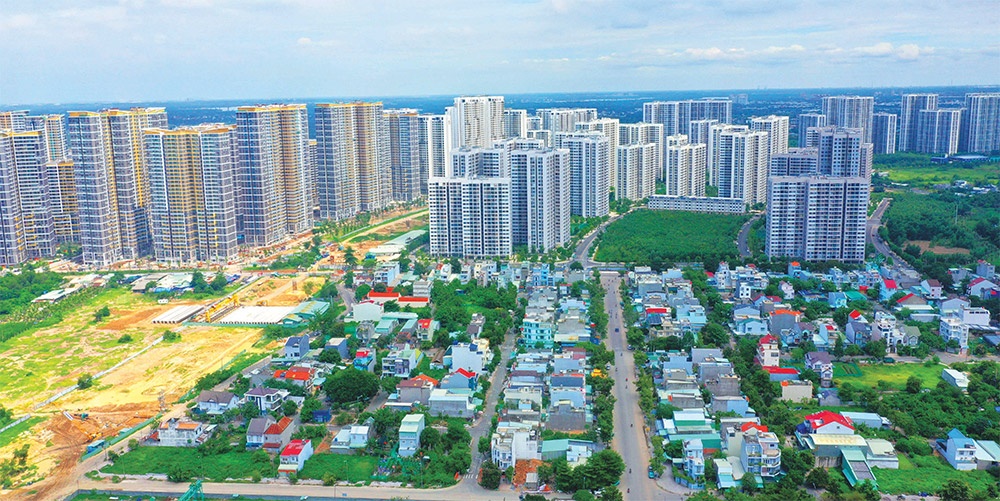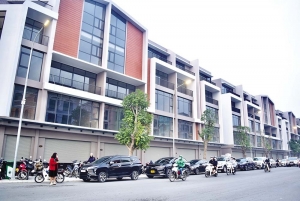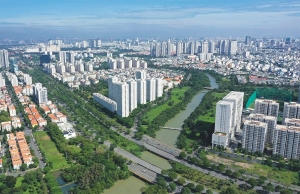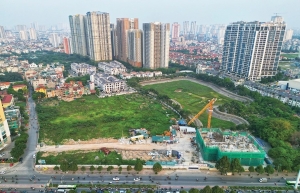Options widen for aspiring homeowners
 |
| Options widen for aspiring homeowners, Photo Le Toan |
Phan Duc Hieu, a standing member of the National Assembly Economic Committee, highlighted that the new Land Law, effective from August 1, has replaced the term “Vietnamese people residing abroad” with “people of Vietnamese origin residing abroad.” This change, along with provisions granting overseas Vietnamese with a Vietnamese passport the same land use rights and obligations as domestic citizens, marks a significant expansion in land access.
“This broader access to land is anticipated to trigger a wave of investment from overseas Vietnamese. Owning property in Vietnam will encourage them to engage more actively in long-term investments, including production and business activities, rather than just remitting money as before,” Hieu said.
Additionally, the revised Land Law allows foreign investors to acquire land use rights in industrial parks, clusters, and high-tech zones. Foreign investors can also transfer or contribute capital with land use rights under government regulations.
“These new provisions will positively impact production and business activities, revitalising the real estate market and driving strong economic development,” Hieu said.
David Jackson, general director of Avison Young Vietnam, said that the new law’s recognition of overseas Vietnamese ownership rights, equal to those of domestic citizens, allowed them to directly own property in their names without needing to use relatives’ names as intermediaries.
“The revised law offers greater clarity and openness, providing overseas Vietnamese with more autonomy and encouraging them to invest in and own real estate in Vietnam,” Jackson said.
The law also allows overseas Vietnamese to engage in real estate business activities like domestic citizens, including both primary and secondary markets.
“Overseas Vietnamese can now consider investing in high-end housing products, benefiting from potential price increases or rental income. Those who are not frequently in Vietnam can explore other investment tools such as fund certificates or bonds instead of directly purchasing real estate,” Jackson added.
“Vietnam is one of the most attractive markets in the region, with significant long-term growth potential in real estate. Expanding access to land will create better conditions for overseas Vietnamese to invest in domestic real estate, whether residential or commercial.”
Pham Anh Khoi, director of Dat Xanh Services, Economics, Finance, and Real Estate Research Institute, said that most overseas Vietnamese were drawn to rental properties with high profitability, viewing real estate in Vietnam as a long-term investment.
“In other countries, particularly the US, interest rates are only 1-2 per cent, so investment products with returns of 3-5 per cent are appealing to overseas Vietnamese. They focus on affordable segments that can be rented out immediately, offering both short-term and long-term profits,” Khoi said.
Data from the OneHousing Centre for Market Research and Customer Understanding indicates that real estate remains a stable investment channel with consistent profit margins. Over the past two years, the average profit margin reached around 12 per cent in Hanoi and 10 per cent in Ho Chi Minh City.
According to the Association of Overseas Vietnamese Businessmen, by the end of 2023, there were 6.5 million overseas Vietnamese, spanning three generations, with more than 20 per cent having reached retirement age. These figures highlight the real demand for accommodation and real estate business opportunities in the domestic market.
Besides overseas Vietnamese, the market is also expected to attract increased interest from foreigners looking to purchase homes and land in Vietnam. The revised Housing Law, which extends homeownership rights for foreigners up to 50 years, is seen as a key factor in energizing the domestic real estate market, particularly in the high-end segment.
Under the previous Housing Law, foreigners could own property for a maximum of 50 years, with the possibility of extension under government regulations. The new laws on housing and land, effective August 1, allows foreigners to extend their ownership rights once after 50 years, up to a total of 100 years.
Real estate developers are already preparing to cater to the anticipated demand from international buyers. For instance, in July, the Hung Yen Department of Construction permitted Vinhomes’ Dream City (Vinhomes Ocean Park 2) and Dai An (Vinhomes Ocean Park 3) eco-urban areas to be sold to foreigners, with each project allowing ownership of 250 individual houses and up to 30 per cent of residential apartments per unit, block, or building.
In May, Danh Khoi Group signed a strategic cooperation agreement with Knightsbridge Partners to market the premium commercial and apartment complex Astral City internationally, starting in Hong Kong.
Knightsbridge Partners, a real estate distributor with a network in key markets such as London, Bangkok, Shanghai, and Dubai, aims to draw in international investors without requiring them to travel to Vietnam.
Dang Thi Nhung, deputy general director of Danh Khoi Group, said, “We aim to expand our reach to a broader customer base and step closer to the international market. Bringing our projects to the global stage will engage the attention of both individual and institutional investors, enabling quicker decision-making.”
According to the Ministry of Construction, in the first half of 2024, foreigners purchased more than 1,000 apartments in Hanoi, with buyers from South Korea, China mainland, Hong Kong, Taiwan, Singapore, and the United States.
 | Real estate businesses eye less optimistic Q2 The latest financial reports from real estate firms reflect lingering hardships, but some have managed to overcome the market stagnation. |
 | Real estate dealmaking can level up through revised laws Vietnam’s mergers and acquisitions in the real estate market are expected to become more attractive to foreign investors following the entry into force of several related laws in August, although effective implementation will take time. |
 | New land laws to expedite house-building progress Housing supply is expected to increase significantly following the implementation of new real estate laws in August, creating numerous opportunities for investors and developers. |
What the stars mean:
★ Poor ★ ★ Promising ★★★ Good ★★★★ Very good ★★★★★ Exceptional
Related Contents
Latest News
More News
- More than $40 billion investment recorded in Asia-Pacific commercial real estate (February 18, 2026 | 19:58)
- Keppel co-hosts Home Hanoi Xuan festival in Hanoi (February 14, 2026 | 09:00)
- Saigon Centre gains LEED platinum and gold certifications (February 12, 2026 | 16:37)
- Construction firms poised for growth on public investment and capital market support (February 11, 2026 | 11:38)
- Mitsubishi acquires Thuan An 1 residential development from PDR (February 09, 2026 | 08:00)
- Frasers Property and GELEX Infrastructure propose new joint venture (February 07, 2026 | 15:00)
- Sun Group led consortium selected as investor for new urban area (February 06, 2026 | 15:20)
- Vietnam breaks into Top 10 countries and regions for LEED outside the US (February 05, 2026 | 17:56)
- Fairmont opens first Vietnam property in Hanoi (February 04, 2026 | 16:09)
- Real estate investment trusts pivotal for long-term success (February 02, 2026 | 11:09)

 Tag:
Tag:



















 Mobile Version
Mobile Version